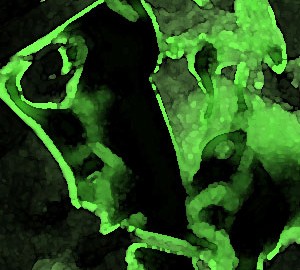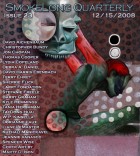Is there a reading of this story that has the title “Heroine Girl”?
Yes, definitely. I was only hoping it wouldn’t be too obvious, or cliched, or taken too much as a pun. Rather to imply that all things are black and white, not black or white. Outcasts have always been good to me. (Though I do confess to always loving that particular homophone: heroin/heroine.)
That kiss set against this lady convulsing! That’s really something. This mixture of light/dark, love/violence, convulsing/kissing appears elsewhere in your work. Talk a bit about that combination, both in “Heroin Girl” and in your other writings.
I think Janis Joplin said to the audience at one of her concerts: “It’s all the same fucking thing, man.” All of us have all of that in us, all at once. Sometimes squalor and beauty are the same thing. The most dangerous people are those who won’t admit their dark sides. (See: George W. Bush).
Talk, if you will, about your handling of plot. How do your stories follow the traditional concept of plot?—and where do they consciously deviate from it?
I do “plot” traditionally in one sense. There is “action” in my stories; things do happen. In some kind of arc or sequence. But my goal is compression, especially in the very short work. I try to pick what Cartier-Bresson called in photography “the decisive moment.” Except in much longer work, I’ll leave back story and all that to inference.
Your work (to me) is both the absolute perfect response to the meaninglessness of the times and an assertion against it. Is there any merit to this thought about your work, Larry? And what do you see as the “philosophy” behind your (very) short fiction?
I think that is an absolutely correct reading of my work. I am a very political person. But I think most political fiction fails because it is didactic. I’m not against that per se. I just think that most often it doesn’t work. to understand something—as a writer at least—you first have to depict it. Starkly and without judgment. The world is as it is, not as we would like it to be. We have to start there. “Straight Outta Compton” is a great (almost documentary) depiction of one facet of life in South Central Los Angeles (I did organizing work in Compton for more than six years). To blame NWA for gang violence is ludicrous. The album is, in an important way, a political statement: to be unflinching about reality is the beginning of a protest against that reality. To find meaning and purpose, you first have to explore the meaninglessness of things. My view—the “philosophy” behind my work, as it were—is to start at the margins, to begin with the outcasts. If you don’t you won’t understand jackshit. It’s frankly why we don’t understand terrorists. Or call official terrorism, as Harold Jaffe puts it—in other words, wantonly dropping bombs on people—what it truly is. I could go on, but my answers are already longer than my story….
“Hope” entered the national vocabulary some time in early November. What do you hope to see come 2009?
We are all both public people and private people, citizens and friends. So we have public hopes and private hopes. I’ll answer on the public side: I hope we have the courage to redistribute the wealth.



 The SmokeLong Grand Micro Contest (The Mikey) is now an annual competition celebrating and compensating the best micro fiction and nonfiction online.
The SmokeLong Grand Micro Contest (The Mikey) is now an annual competition celebrating and compensating the best micro fiction and nonfiction online.